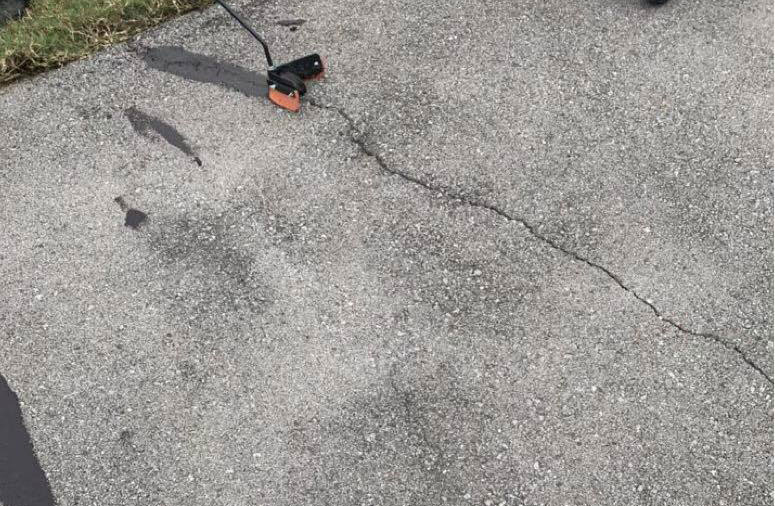And there’s a good reason to do so. A DIY asphalt repair project won’t just enhance the appearance of your property. It’ll also ensure that you and your family are not at risk of injury, since asphalt cracks and other pavement surface issues can cause people to trip.
You don’t need to live with deep cracks on the surface of your asphalt driveway. You can consider repairing the damage to keep the cracks from becoming a bigger problem later on. There are multiple ways to do this. If the issue is severe, you can work with an asphalt driveway repair company. If the damage is minimal, you can undertake your asphalt repair project yourself.
On this page, you’ll find everything you need to know about repair methods for asphalt driveway cracks and other asphalt pavement issues. With some expert advice, you can fix those holes and wide cracks and get the front of your house back to looking its best.
Why Do Asphalt Driveways Need Repairing?
An asphalt driveway repair project can seem like an annoying chore, but from time to time, they are unavoidable. After all, asphalt driveways, like concrete driveways, have to take a lot of hits during the course of their lifetime.
The surface can be affected by the elements such as snow and the freeze-thaw cycle. Once the weather elements have compromised the surface, water can seep under the top layer and weaken the structural integrity of the driveway. This is why cracking is such an issue in cold climates and with homes that have poor drainage.
It’s not a problem that goes away on its own. Asphalt that has just a small amount of cracking will develop more issues if the surface is not repaired, especially if it has to routinely take the weight of heavy vehicles.
Common Asphalt Problems
There’s not just one type of asphalt damage. There are many different types. While you might just see cracks and potholes, the cause and type of problem can vary. There are fatigue cracks, also called alligator cracks, for instance; they’re called this because they literally look like the scales on an alligator’s back.
Potholes are just as they sound: holes in the ground. You’ll most definitely feel a pothole if you drive over it — and if you accidentally step in one, too. The most common cause of smaller cracks is poorly installed hot asphalt. If the foundation of the asphalt is not robust, then you’ll need to repair cracks sooner or later.
Should You Repair Asphalt Cracks or Potholes Yourself?
Now, that’s a big question. There are plenty of people who see large cracks in their driveway and think, “this is a job for trained experts.” However, that’s not always the case. It is sometimes possible to repair potholes and other issues yourself.
How do you know whether you should repair the surface yourself or you should leave it to a contractor that specializes in repairing asphalt driveways?
A good rule of thumb is to look at the size of the damage. If we’re talking about minor cracking, then you’ll likely be able to fix it yourself. If we’re talking about large holes or serious cracking, then those holes may indicate a bigger underlying problem. At which point, you’ll need to hire a repairing company to identify the issue and lay some new asphalt for you.
But let’s assume that the asphalt damage is slight and that you’re able to do the job yourself. Below, we’ll go through the repair methods you need to ensure that your driveway is completely compacted and in the best condition possible.
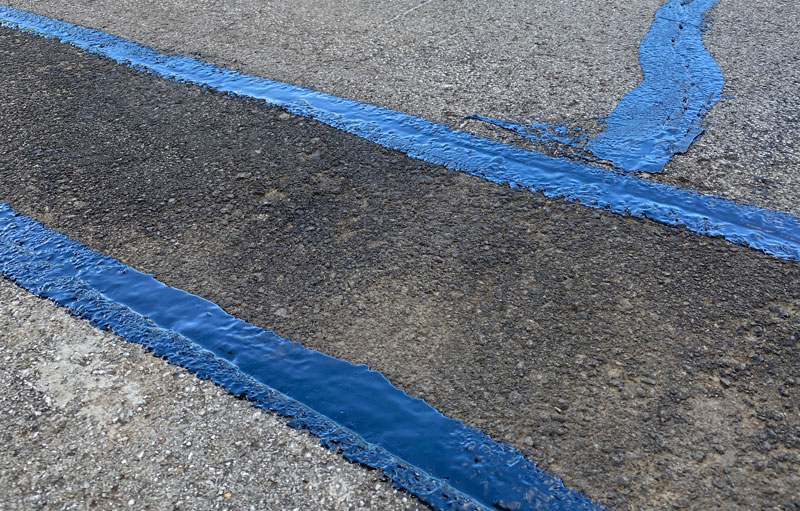
Find the Right Material for Asphalt Repair
The process of fixing your asphalt driveway is similar to how you would fix a concrete issue. The process of correcting asphalt is a bit different from concrete, largely because asphalt has a softer consistency than concrete.
For asphalt repair there are a number of items you can use, some of which you may not have heard of before. For this reason, the repair material you see may seem a little unfamiliar at first. It’s important to learn about the different asphalt crack filler products available and then make the decision that’s right for you.
To begin, let’s outline something important: you won’t be using hot asphalt to fill your potholes and cracks. You’ll be using something that will ‘patch’ the pavement issue. Think of these products in the same way that you’d think about a wall filler. You’re not building a new wall when you use these products; you’re just using the product to fill the surface, so it’s all smooth again.
The type of item you use for the asphalt repair job will depend on the size of the crack or the potholes. You may use a ‘crack filler’ or an asphalt cold patch. There are many such items available for purchase, so you should have no problem finding the solution to your issue. One pro tip: be sure to follow the manufacturer’s directions before you start. The process of using the product to fix your asphalt may seem obvious, but they all have specialized instructions that you should read carefully before applying to your existing asphalt.
What You’ll Need
The asphalt product you use to fill the pavement crack will be the most important product that you use. But it won’t be the only item that you need. You’ll also need some household items to apply the fill to the crack.
In addition to the fill product, you’ll need a shovel, garden hose, putty knife, weed killer, sand, and an asphalt sealant. You may not use all of those items during your asphalt project (sand is only needed if the asphalt crack is deep, for instance), but those are useful tools to have on hand.
Clear the Space
You’ll want the repaired area to be fit for use for many years. To increase the chances of that happening, you should ensure that there’s no debris or other dirt in the crack. You should also pull out any weeds by hand. From there, use a pressure washer to blast the cracked pavement with water. That’ll help to get rid of the debris and dirt that you could not scoop up originally.
The end result should be a surface that’s fully clean. You’ll also need to shovel debris and dirt from the surrounding surface with a push broom to ensure it doesn’t fall back into the hole before you’ve finished the project.
Get Rid Of Weeds
We mentioned above how you should pull out any weeds that are occupying space in your asphalt crack. However, it’s important to remember that weeds are resilient. Even if the pavement looks like it’s free of weeds, that may not be the case. To ensure that your repair job lasts for as long as possible, you’ll need to apply some weed killer to the cracks in your driveway. If you don’t, then those weeds will return, and could cause damage to your fresh asphalt.
Weed killer products are readily available and to ensure effectiveness, follow the instructions carefully, and then wait for the killer to dry. Once it has, you can move on to the next phase of the repair project.
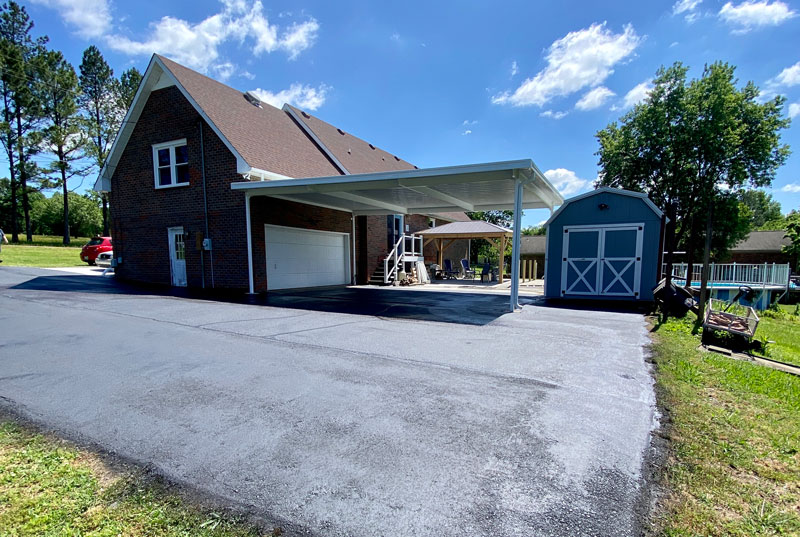
Handling Small Cracks
For small cracks, you’ll need your crack filler material. There are different variations of this product, but in most instances, you’ll find that they’re sold in tubes that can be squeezed by hand or with a caulk gun, which makes it easy to aim and discharge the filler. You should pour enough into the hole to fill the crack to the point where it’s slightly overflowing. You can then use your putty knife or a trowel to compact and tidy up the filler.
Handling Bigger Cracks
If the crack is a bit deeper (more than 1/2 inch of the surface), then you’ll need to fill in some of the hole with sand. This forms an excellent base upon which you can then apply your patching compound. To do this, mix sand with water in a bucket so that it creates a firm texture, and then partially fill in the hole. Once it is fully dry, you can move onto the next step.
Use Your Asphalt Patching Compound
Next, you’ll use the patching compound to fill in the hole entirely. To do this, simply pour the compound directly into the crack from the container, or you can add it to a bucket and then add it using that, whatever’s easiest for you. For holes or cracks larger than ½ inch, you may mix sand with the patching compound to a putty consistency to improve the strength and longevity of the repair. Once you’ve added the compound, push it down using your trowel so that it’s “tight.” Keep adding until the top of the mixture is level with the ground. Sprinkling sand on top of the compound will keep the patched crack from being sticky while it dries and will make the finished repair more durable to wear and tear.
Time to Cure Asphalt when Repairing
The compound won’t be solid straight away. It’ll still be wet, so you’ll need to give it time to dry. How long this process will take will depend on various factors, including the type of compound that you use and how big the crack is. If it’s only small, then it might only take a few hours. If it’s a big one, then it might need twenty-four hours — or even a few days. It’s best to corner off the larger holes using cones (or something similarly noticeable) so that no one accidentally walks into it.
Add Asphalt Sealant
Finally, look at adding a sealant to your driveway. This will provide an additional level of protection from the elements and other factors that may compromise the quality of your driveway. Apply the sealer evenly over the surface and allow it to dry. With some sealer products, you’ll need to apply a second layer some time after, but read the product instructions to be sure.
Handling Oil Stains on Asphalt
Need to fix troublesome oil stains? They can affect the appearance of an asphalt patch and make it more susceptible to damage. You can get rid of them by using a driveway cleaner and a stiff brush. Scrub the asphalt patch hard, and it’ll nearly look like you have fresh asphalt.
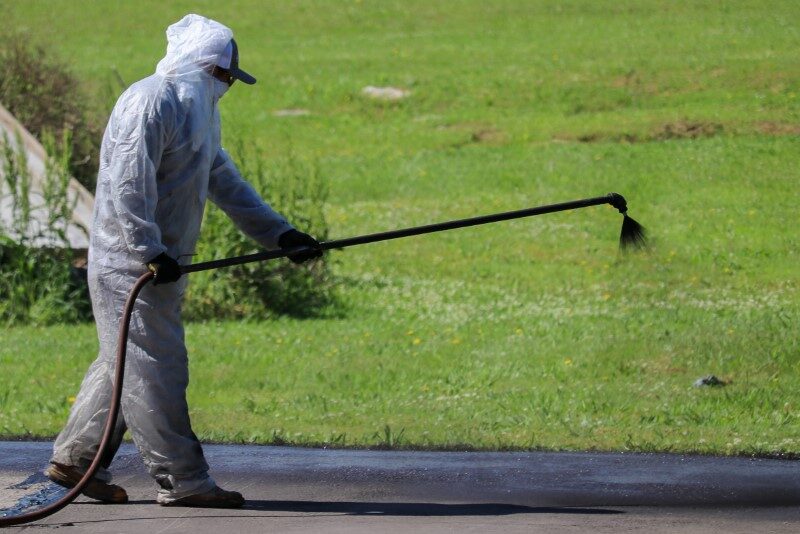
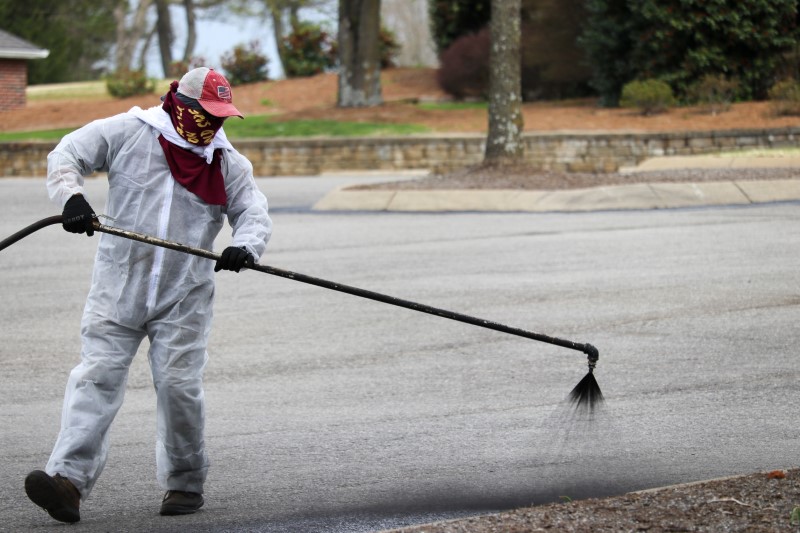
Preventative Measures for Asphalt Maintenance
Once you’ve followed the above steps, you’ll have a high-functioning asphalt driveway with no visibly open cracks. But that doesn’t necessarily mean that your duties are over for good. If you’re going to take the time to repair and fill your asphalt, then you’ll hope to avoid cracking for as long as possible.
So how can you prevent future cracks in your asphalt? It’s all about preventative asphalt maintenance. Driveways can be a little tricky, sure, but with a bit of TLC, you can help to prevent future cracks and other issues that will require a patch job.
If you’re serious about keeping your driveway looking its best, spend some time looking for potential issues each month. Cracks usually start off small; the earlier you notice them, the easier it’ll be to keep your asphalt looking its best.
You should also ensure that your driveway is draining properly. Many asphalt issues can be traced back to water. If you see a standing pool of water on your driveway, then something isn’t quite right. You can usually fix this issue by directing gutters away from your asphalt pavement and toward another part of your property.
It’s also recommended that you use our advice above and clean up any oil (or other chemical) spills on your asphalt. They can impact the asphalt, making it more likely that you’ll have issues — and more likely that you’ll need to undertake another asphalt driveway repair sooner rather than later.
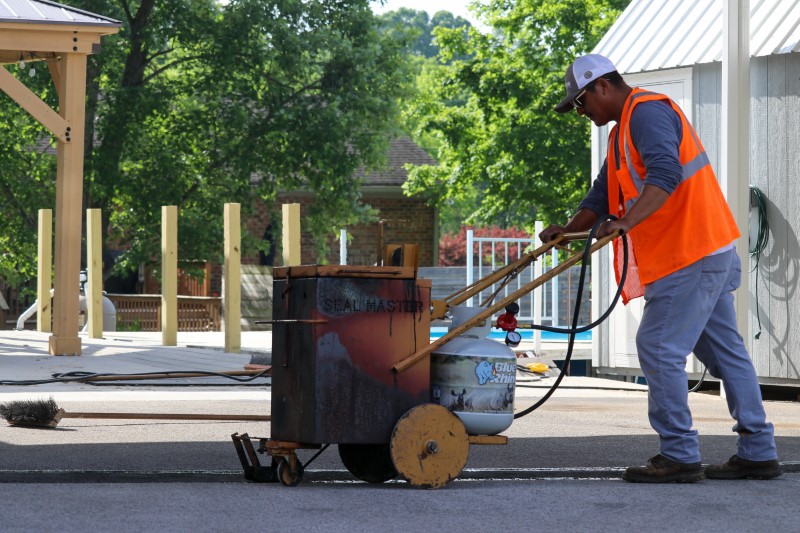
Sometimes, professional repair of asphalt cracks in the best and most cost efficient way to resolve a problem.
Final Thoughts on Asphalt Repair
No one wants to undertake an asphalt repair project. After all, no one wants to have any issues with their property. But if you live on a property for long enough, then sooner or later, you’ll need to learn about asphalt repair. Asphalt is not meant to last forever, after all.
But happily, filling cracks and potholes that appear on your top asphalt layer is not the most difficult DIY project in the world.
Anyone who has the basic tools and some time on their hands can complete this project. So if you see a small crack in your driveway, look at taking action. In the process, you’ll get a beautiful, crack free driveway, and you’ll also have learned a new skill.
We service Donelson, TN! If you are in Donelson and are looking for professional asphalt repair services, please reach out today!

